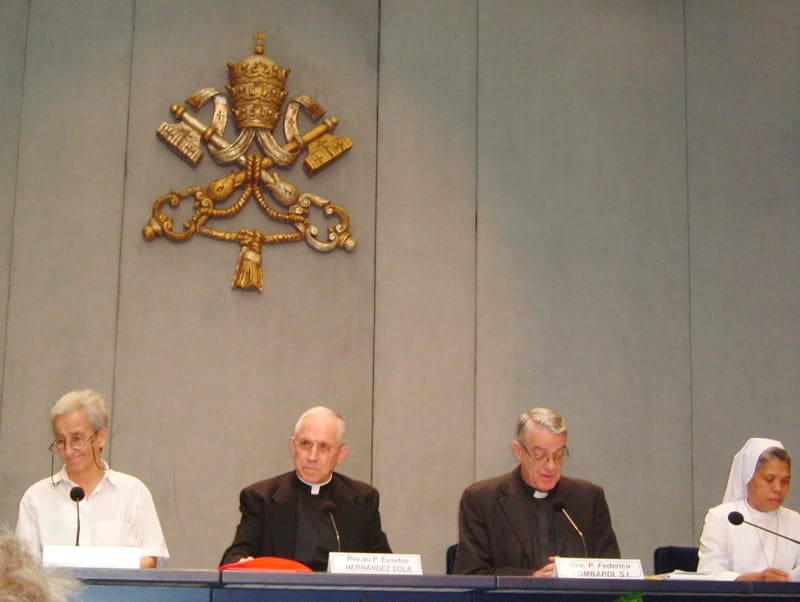From June 15 to 18, the Congress, “Religious women in network against human trafficking, was held in Rome organized by the Union of Women Superiors General and by the International Organization for Migrants. In the presentation of the event, the Augustinian Recollect Eusebio Hernández, head of the office of the Congregation for Institutes of Consecrated Life and Societies of Apostolic life, explained that “ the problem of human trafficking constitutes a new form of slavery of the XXI century that violates the dignity and freedom of so many women and girls, and also today, of men and boys, coming mainly from poor countries.”
He pointed out: “These new forms of poverty remind us that religious life, by vocation, is called to take a prophetic role in the society and in the Church of our epoch. A new vision of charity must take consecrated life to the new frontiers of evangelization, to the new forms of poverty, among which, one of the most grave is the loss of one’s own dignity.”
Speech
We present here the whole speech of Eusebio Hernández, translated from Italian for publication on the official website of the Order:
“The Church depends a great deal on consecrated women for new efforts in fostering Christian doctrine and morals, family and social life, and especially in everything that affects the dignity of women and respect for human life.” (Vita consacrata 58) This gathering is the second congress that deals with this theme. The finality is to evaluate the implementation of the contents of the Final Declaration of last year, that is, “We denounce that human trafficking is a crime and that it represents a grave offense against human dignity and a serious violation of human rights.” The trade of human persons constitutes an assault to human dignity and a grave violation of fundamental human rights. The second Vatican Council had already defined “slavery, prostitution, the selling of women and children” as “disgraceful.” (Gaudium et spes, n. 27).
The Holy Father, Benedict XVI, in his message for the Day of Peace of 2007, manifested a particular attention to the condition of women and denounced that the exploitation, discrimination and the diverse forms of violence against women constitute a lack of respect to the dignity of women.
Human Trafficking
The Congregation for Institutes of Consecrated Life and Societies of Apostolic life has studied already this argument in a meeting of the “Council of the 16,” in January of 2006. The problem of “human trafficking” constitutes a new form of slavery of the XXI century, which wounds the dignity and freedom of so many women and minors, and today also of children and men, who come from poor countries in general.
During the Congress, the crude and humiliating drama of so many women, who are victims of exploitation, will surely emerge, and the role of so many religious women, who, faithful to their foundational charism, have known how to risk and to respond with courage to these new challenges.
In the Guidelines for pastoral ministry of the street of the Pontifical Council for Migrants and Itinerants, the Conferences of major superiors of religious were specifically tasked to choose persons who were links of network running in the inside and outside of their respective countries.
The Union of Major Superior of Women Religious of Italy has been working as a network among religious women for a time already, and has moved for the creation of shelters for these young women. It will be important now to find the mode of reinforcing and extending this network of information, intervention and collaboration; in particular, it is important to consolidate the project in network among countries of origin, transit and destination.
Prophetic Role
I think, also, that this urgent challenge requires a preparation and a greater involvement of the ecclesiastical and religious person in the various spheres of parish, family and social life. There is the need to work much in the formation of the youth at school and parishes in order to instill in them the value of respect for the person, whose dignity can never be treated as a mere commodity. Repression and punishment do not serve if the consciences are not formed according to authentic human and Christian values.
These new forms of poverty remind us that religious life, by vocation, is called, to develop a prophetic role in the society and the Church of today. A new vision of charity must bring consecrated life to the new frontiers of evangelization, of the new forms of poverty, and among the most serious, the loss of one’s own dignity.
I cannot end this brief address without particularly considering, with affection and gratitude, all those who work in this delicate and difficult field of apostolate. My thought is directed specially towards consecrated women, who, having made the irrevocable choice of “loving God above all things,” are bent with mercy for their brothers and sisters who are suffering more and are more unhappy, because they are humbled and deprived of the most precious gift, the very dignity of the human being. To all these person, our gratitude and special prayer: without these “Samaritan women,” humanity would be more poor and miserable.


